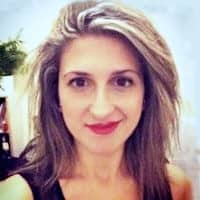#phdstory | Martina Riberto


What is your main research topic?
I am a PhD student in Cognitive Neuroscience and Experimental Psychology. I am interested in how our brain elaborates emotional events and how we make judgments about them. In particular, my PhD project aims at investigating how our brain functions when we judge the similarity between emotional experiences in mentally healthy people.
What do you mean with emotional events?
Events that have an emotional impact in someone’s life. For example, passing an important exam is an emotional event, brushing your teeth is a non-emotional event.
Which approach do you use? Is this a new approach?
This is a new topic. No one in the past has investigated the judgement of similarity between emotional events, but only between neutral or non-emotional events. And yes, we use a new approach, as we want to combine different techniques, such as Functional Resonance Magnetic Imaging (FMRI), and Transcranial Magnetic Stimulation (TMS). FMRI allows us to see which areas of the brain activate during an action, while the TMS allows us to identify which of those areas are directly involved in that action. These are not-invasive research methods that allow to explore in vivo the functioning of brain. That means we will be studying the functioning of the brain in real time, when the brain is actually functioning.
You also collaborate with other researchers?
Yes. My PhD project was developed in collaboration with the Weizmann Institute of Science in Israel. I will move there this September and I will stay there for 2 years. So, yes, it is an international collaboration.
What motivated you to enter this field of study?
I’ve always been very interested in emotions, at first because I am a very emotional and passionate person, so I want to understand where these aspects come from. Then, I think that perceiving and elaborating emotions is something that makes human beings unique species. I mean, animals perceive emotion as well, but I think emotions are the core of human life story. And finally, it’s very interesting from a clinical perspective: I am a clinical psychologist, and most of psychiatry/psychological disorders I’ve worked with when I was in Italy, in San Raffaele Hospital, involved emotional disturbances, and I want to do my best to try to also solve their problem, or at least help those patients to cope better with their disorder.
What makes you get out of bed in the morning? What inspires you?
This is a very interesting question. At first it is, of course, the passion for my job. But mainly it is my curiosity and my sense of adventure. With this I mean that this PhD is not only a chance to grow in terms of professional experience, but it is an adventure that started when I moved to Manchester, will continue when I move to Israel this September, and will end when I am back here in Manchester again. So, all this travelling is a way to challenge myself, day after day, and I will have the opportunity to see how I will cope with living in different places, meeting people from different cultures. In summary, how will I react towards all these experiences that are awaiting me. This really gets me going.
To you, what would it mean to be successful?
From a professional point of view, being successful for me is having the opportunity or being lucky enough to have a job that you really love in a nice, friendly, non-stressful environment. From a personal point of view, it is really simple in my opinion; being loved by someone that you love as well.
Where do you see yourself in 10 years?
Ahha, maybe living in Tenerife with my sister. I am only joking. I don’t know, actually. It depends on what the future will offer me. Right now, I really like this job, I like doing research and I feel that it also fits with me and my personality. So maybe, in 10 years I’ll be a lecturer trying to to enrich my students with my knowledge and experiences, and I will be enriched as well from their experiences, reasoning and thinking … a bidirectional enrichment, basically. But I am not sure, that’s all I can tell. Many things can change, right?
What makes life meaningful?
Oh, this is very easy for me. Human relationships. Any kind of relationship. Choose one, it is essential for a meaningful life.
What kind of society do you dream of?
I dream of a more spiritual society. I mean a society where money, power and material things play a less important role than now, where people don’t waste their time posting a fake life on social media, or struggling for the material aspects of life, but rather try to enrich their soul and mind. Utopia!
Do you have a personal dream?
Yes, it’s very simple actually, maybe banal but it’s my dream… I want to have a happy and healthy family. The rest will be a consequence of it.
If you could, what would you tell your younger self?
Don’t fight against yourself. Freely be what you are!
If you could, what would you tell your future self?
Remember that you’re capable of things you didn’t even know were possible.

“I was really impressed by the passion that Martina had while describing her PhD topic, and how the fact that she is a very emotional person made her very interested in study human emotion at the point she is doing a Ph.D. on them. It really makes me think how our personalities can define our passions and our carries.”

“I was really impressed by the passion that Martina had while describing her PhD topic, and how the fact that she is a very emotional person made her very interested in study human emotion at the point she is doing a Ph.D. on them. It really makes me think how our personalities can define our passions and our carries.”